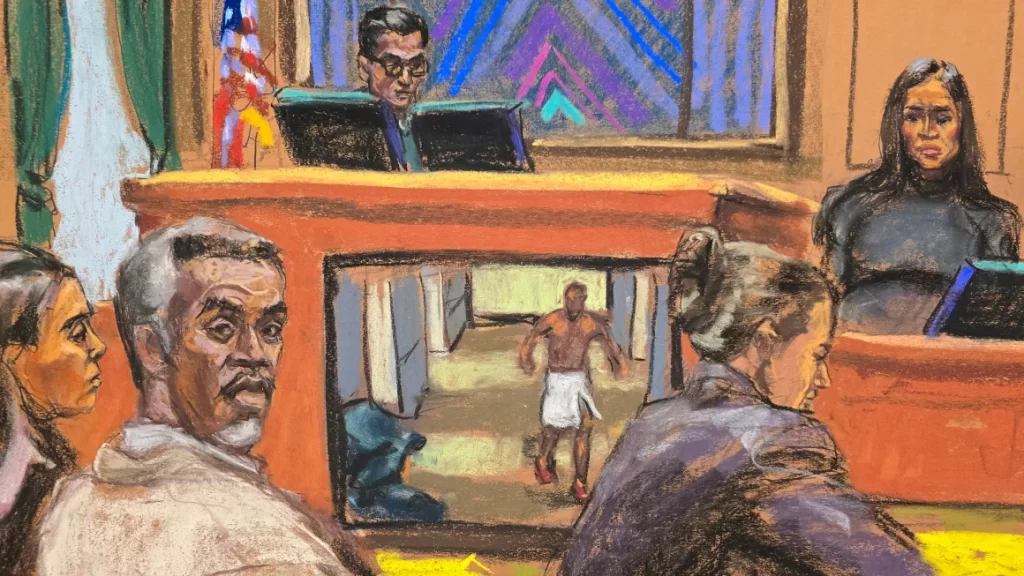
Cassie’s Allegations and Struggles
The Diddy Cassie trial is more than celebrity drama. It’s a mirror held up to our culture, revealing what happens when addiction, trauma, power, and silence feed each other for too long.
In her civil lawsuit, Cassie Ventura describes a 10-year relationship marked by alleged abuse, coercion, and substance use. She claims she was introduced to ecstasy, ketamine, and opioids, substances she used to numb herself during what court documents called “freak offs.”
This wasn’t partying. This was coping through chaos in a relationship that blurred the lines between love, loyalty, and survival.
Addiction as Control: What the Trial Suggests
Cassie alleges Sean “Diddy” Combs not only used drugs like cocaine and ecstasy, but also provided them to others. These claims raise an uncomfortable but important question:
Who was supplying these substances?
When billionaires battle addiction, the supply chain isn’t back-alley dealers, it’s assistants, security, “friends,” and sometimes even licensed professionals. The addiction becomes institutionalized, protected by wealth, sustained by silence.
At this level, addiction doesn’t look chaotic. It looks curated. And that’s why it’s so hard to stop
Source: Billboard Coverage of Lawsuit
What Is PnP Culture, and Why Is It So Dangerous?
“Party and Play” (PnP), or chemsex, refers to combining drug use and sexual activity, often using ecstasy, meth, or ketamine to disassociate from emotional pain and social inhibition. While it began in LGBTQ+ subcultures, it’s now common in music, nightlife, and celebrity spaces.
In these spaces, the drug doesn’t just amplify the moment, it erases the line between consent and compliance.
Cassie’s claims suggest that what appeared glamorous was, in fact, a chemically dependent environment where trauma became routine.
When Relapse Is a Person, Not a Pill…
In trauma recovery, there’s something called a relationship-triggered relapse. That’s when substance use is less about craving the drug, and more about being around the person or environment that created the original wound.
Cassie reportedly only used when she was with Diddy.
That’s not addiction in isolation.
That’s relapse tied to trauma bonding, a toxic loop of comfort, control, and chemical dependency.
The Hidden Hands That Keep Addiction Alive
Addiction doesn’t exist in a vacuum. Behind most powerful people struggling with substance use, you’ll find handlers and protectors who keep the system running.
Why Does No One Speak Up?
Because disrupting that cycle risks the brand. The tour. The checks.
Whether intentional or complicit, these hidden hands shield the addiction instead of addressing it. The result? Another crisis. Another cover-up.
The Pressure of Public Image and the Performance of Healing
Celebrities often don’t get to recover. They get to pretend.
Even when they go to treatment, they’re expected to return perfectly polished, ready to perform, to sell, to be “better.” But healing doesn’t happen in the spotlight. It happens in safe spaces. With time. And truth.
Cassie may have gone to rehab. Diddy reportedly overdosed in 2012. But what followed was silence, not public accountability, not visible support.
Source: Law & Crime Trial Summary
What Role Did Peer Support, Or Lack of It, Play?
This is the question Watch Light exists to ask.
- Cassie needed someone after rehab.
- Diddy needed someone after his overdose.
- They both needed someone outside the chaos to walk with them through the fog.
Without peer-based recovery support, trauma doesn’t dissolve, it deepens.
And relapse isn’t a matter of if.
It’s when.
The Watch Light Model: Peer Support After Rehab That Actually Works
Watch Light Pathways was created for exactly this reason. We provide:
- Post-rehab creative recovery support
- Certified peer specialists with lived experience
- Career-safe, trauma-informed coaching
- Structured accountability for artists and entrepreneurs in transition
We don’t offer treatment, we offer what happens after treatment, when most people fall through the cracks.
This Is Why We Exist
At Watch Light Pathways, we ask the harder question:
What if someone had intervened?
Not at the courtroom. Not in a press release.
But in the quiet, vulnerable space between relapse and recovery.
What if someone had walked with them, before the damage became legacy?
This isn’t about celebrity gossip.
This is about real addiction, real trauma, and the silence in between.
This is why we show up. Before the lights fade.
Ready to Step In or Help Us Do It?
If you or someone you love is coming out of treatment and needs structured, creative-aligned recovery support, we’re here.
If You Believe Prevention Is More Powerful Than Apology
Every dollar helps us walk with the next artist, creative entrepreneur, or survivor trying rebuild and stay sober, stable, and seen.
